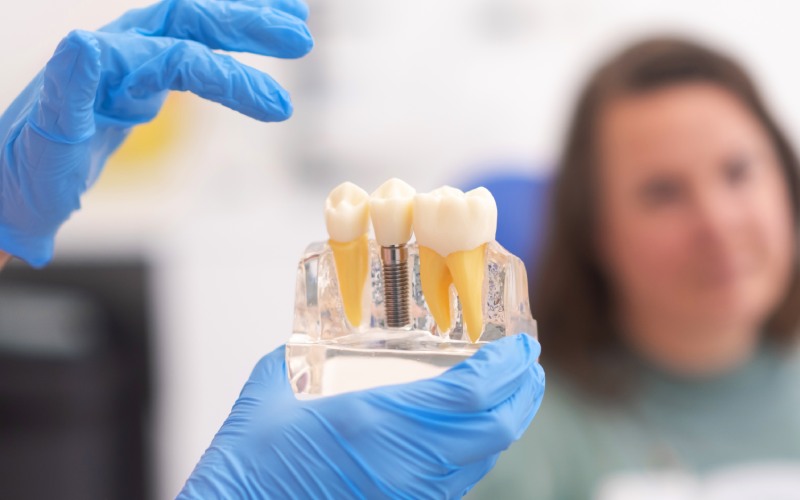Dental implants are designed to be long-lasting replacements for missing teeth, but they require proper care and maintenance to function effectively over time. Implants are not susceptible to decay like your natural teeth, but they are still vulnerable to issues such as infection, gum disease, mechanical damage and other complications. Neglecting proper care can lead to complications that may compromise the success of the implant treatment. However, with good care, implants can last as long as 20 years or so.
Table of Contents
ToggleBe Aware of Potential Complications
While the overall risk of complications with dental implants is very low, as implants have up to a 95% success rate, patients should be aware of potential signs of issues that may arise. Taking good care of your dental implant, and visiting your dentist as soon as any signs of concerns arise will increase the likelihood of your dental implant remaining in good condition to provide you with years of service.
Persistent pain, swollen, red gums, or pus may indicate inflammation or infection, which can compromise the stability of the implant and surrounding tissues. Discomfort can also suggest unresolved healing, irritation, placement issues, or trauma to the implant.
Bleeding when brushing can be a sign of gum disease, which can lead to gum recession. Receding gums expose the implant to bacterial invasion, increasing the risk of peri-implantitis—a condition characterized by inflammation and bone loss around the implant. Gum recession around an implant can also compromise its stability.
If your implant feels loose, it might not be integrating with your bone properly, which will affect its stability and functionality.
With any of these issues, or whenever you are in doubt, contact your dentist as soon as possible, as leaving an issue untreated can lead to dental implant failure.
Maintain an Excellent Oral Hygiene Routine
Establishing and maintaining a consistent oral hygiene routine is crucial for the health of dental implants. Brushing with a soft-bristled toothbrush and non-abrasive toothpaste removes plaque and bacteria from the implant surface and surrounding gum tissue, which can lead to inflammation and gum disease if left unchecked. Don’t forget to floss to remove food particles and plaque from the spaces between your implant and your other teeth.

Schedule Regular Dental Check-ups
Routine dental check-ups every six months are essential for monitoring the condition of dental implants, to maintain oral health and identify any potential issues early on. During these visits, your dentist will perform a thorough examination of the implants, assess the health of the surrounding gum tissue, and conduct professional cleaning to remove plaque and tartar buildup. If there are any problems, this allows for prompt intervention and treatment, minimizing the risk of complications and preserving the integrity of the implants.
Avoid Smoking and Drinking
Smoking is associated with implant failure, as it impairs blood flow to the gums and bone, hindering the healing process after implant surgery. Smokers are at a significantly higher risk of developing peri-implantitis, a condition characterized by inflammation and bone loss around the implants. Quitting, or avoiding smoking for at least four to six weeks before and after your implant surgery decreases your risks of issues.
Similarly, drinking alcohol can compromise your ability to heal properly following implant placement, so you should avoid this for at least a couple of days before and after your surgery.
Maintain a Balanced Diet
A nutritious diet plays a critical role in supporting the health of dental implants and surrounding tissues. Calcium and vitamin D are essential for maintaining strong bone density, which is important for the long-term success of implants. You should consume a variety of calcium-rich foods such as dairy products, leafy greens, and fortified foods to promote bone health and reduce the risk of complications.
Additionally, avoiding sugary snacks and beverages can help prevent plaque buildup and reduce the risk of gum disease, which can compromise the stability of dental implants.
Protect Your Implant During Physical Activities
If you participate in contact sports or activities with a risk of facial impact or dental trauma, take precautions to protect your dental implant, and other teeth. Wearing a custom-fitted mouthguard can help prevent trauma to implants and natural teeth, reducing the risk of damage and preserving their integrity.
If you grind your teeth, you should wear a custom night guard to alleviate pressure on the implants while sleeping, minimizing the risk of excess wear and tear to help your implant last longer.

Collaborate Closely With Your Dentist
Be sure to follow any instructions. Also, if you have any health conditions or are on any medications, let your dentist know, as this may impact your risks of issues. However, your dentist can discuss your options and ways to mitigate these risks.
Gateshead Dental offers dental implants to help our patients with missing teeth. If you are considering a dental implant, or have questions about your existing one, give us a call. Our friendly team is here to help!
He’s completed a number of additional courses to best serve his patients and be able to educate them too. No matter your age or dental condition Dr. Sims can assist you in a professional manner and loves answering any of your questions or concerns.
- How to Care for Dental Implants - April 26, 2024
- Is It Safe to Have Dental Work Done During Pregnancy? - February 28, 2024
- How Does A Dental Bridge Work? - January 17, 2024
